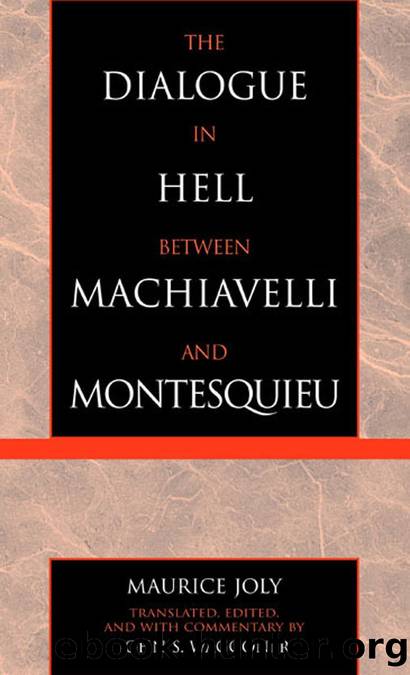The Dialogue in Hell between Machiavelli and Montesquieu: Humanitarian Despotism and the Conditions of Modern Tyranny (Applications of Political Theory) by Maurice Joly & Maurice Joly

Author:Maurice Joly & Maurice Joly [Joly, Maurice]
Language: eng
Format: mobi
ISBN: 9780739154199
Publisher: Lexington Books
Published: 2002-09-03T16:00:00+00:00
Plebiscitory Democracy
Montesquieu assumes that Machiavelli's constitution will be foisted upon the people "without the consent of the nation." In fact, Machiavelli has no intention to so offend "traditional opinion." He must iterate his conformity with such ideas and will even go one better than Montesquieu in their direction. The nation will not only be involved with the new prince in the preparation of a fundamental charter but directly so. Accordingly, the people will be immediately called upon to ratify the coup "by popular vote." There is no question about the outcome. All are pleased by his reign's promise of general peace as well as by the benefits it promises to bring to each group individually.
Moreover, the prince sees himself as bringing about what all the peoples of Europe ardently aspire to. Universal manhood suffrage is decreed before such ratification takes place. The "poll tax and class-based qualifications" will be abolished. As Montesquieu quickly points out, such a step is far from progressive. It intends to reduce the influence of the enlightened few so that the prince may, by dint of raw "numbers," justify his usurpation and begin to harness the "blind power" of the people to his will. Absolutism will be set up in a single stroke as popular will becomes the very base of his government.
In Part One, Montesquieu held that constitutional rule was the most historically advanced regime precisely because its institutions gave soundest expression to the fundamental principle of popular sovereignty. In the rule Machiavelli begins to describe, that principle finds even more direct expression in a plebiscite called to ratify the constitution submitted by the prince. As Machiavelli insisted in his discussion of political origins, we indeed find "brute force" as the fundamental reality. But it is masked by certain "forms" congruent with the times and the democratic thrust of history.8
Machiavelli claims to be not unlike a Washington in establishing universal manhood suffrage for his nation. But as Montesquieu points out, Americans were not called upon to ratify their constitution directly. Rather, it was "discussed, deliberated, and voted upon by the representatives of the nation" in numerous assemblies. Machiavelli sarcastically ridicules Montesquieu's reproof as belonging to "eighteenth century" ideas, wholly out of step with "modern times."
Mimicking criticisms formerly made by Montesquieu, Machiavelli implies that it is not he who suffers from certain antiquated notions. "For goodness sake. Let's not confuse times, places, and peoples. My constitution is presented en bloc. It is accepted en bloc." The specific articles of its text will not be formally debated and discussed. In associating himself with Washington, the new prince has no intention of founding a republic in the manner of the United States. Rather, he invokes Washington's name as one who stood in the vanguard of the people, properly reflecting the spirit of time and place.
Ratified at large, in a plebiscite and not in conventions, the new constitution will retain a singleness of design and purpose that is requisite to a strong and enduring rule. "A constitution must issue,
Download
This site does not store any files on its server. We only index and link to content provided by other sites. Please contact the content providers to delete copyright contents if any and email us, we'll remove relevant links or contents immediately.
| Elections & Political Process | Ideologies & Doctrines |
| International & World Politics | Political Science |
| Public Affairs & Policy | Specific Topics |
| United States |
The Secret History by Donna Tartt(16617)
The Social Justice Warrior Handbook by Lisa De Pasquale(11489)
Thirteen Reasons Why by Jay Asher(7785)
This Is How You Lose Her by Junot Diaz(5764)
Weapons of Math Destruction by Cathy O'Neil(5034)
Zero to One by Peter Thiel(4823)
The Myth of the Strong Leader by Archie Brown(4789)
Promise Me, Dad by Joe Biden(4444)
Stone's Rules by Roger Stone(4415)
Beartown by Fredrik Backman(4411)
How Democracies Die by Steven Levitsky & Daniel Ziblatt(4396)
The Fire Next Time by James Baldwin(4340)
100 Deadly Skills by Clint Emerson(4075)
A Higher Loyalty: Truth, Lies, and Leadership by James Comey(4031)
Rise and Kill First by Ronen Bergman(4012)
The David Icke Guide to the Global Conspiracy (and how to end it) by David Icke(3880)
The Farm by Tom Rob Smith(3871)
Secrecy World by Jake Bernstein(3782)
The Doomsday Machine by Daniel Ellsberg(3730)
